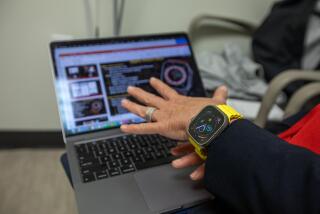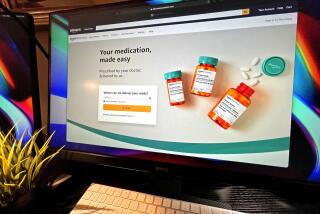‘Smart Cards’ Could Save Lives--and Dollars : Health care: A computerized personal medical record would assist doctors and pharmacists and avert dangerous errors.
- Share via
In his book “Putting People First,” candidate Bill Clinton advocated providing “all Americans (with) ‘smart cards’ coded with their personal medical information.” In redeeming that pledge, President Clinton could empower everyone who relies on our health-care system to become an instrument of its reform.
Smart cards are similar to credit cards in size and thickness. What gives them their “smarts” is a tiny computer microchip. Put that card in a computerized reader and the cardholder now has access to his or her own records. Writing data into a smart card takes just a few seconds; the process is as easy as transferring data from a PC to a diskette. Think of the smart card as a computer that can process and store your medical record and you will grasp its potential power.
Automated patient information would obviously speed up the processing of claims. Its greater value lies in preventing the sort of errors that routinely occur when physicians prescribe a drug or procedure based on a patient’s symptoms but without access to key elements of the individual’s medical and medication histories. The result in some instances is a drug or treatment that harms rather than heals. Adverse drug reactions take their heaviest toll among older patients.
Many adverse drug reactions could be prevented if the physician who prescribed the drug and the pharmacist who dispensed it had better information about the patient. But all too often there is no patient “record.” There are only fragments of information--some on paper, others in computers--scattered among clinics, hospitals and pharmacies.
That fragmentation inevitably leads to higher costs when examinations, laboratory tests and prescriptions are duplicated because one clinician has no access to the information others have gathered. It also leads to doctors prescribing drugs and therapy they would not have ordered had they been able to see a more complete patient record.
While many pharmacies routinely use computerized drug-screening software, physicians seldom do. The problem is not the software itself--it is available from multiple sources and reasonably priced. The problem is the fragmented nature of medical record-keeping. The best drug-screening software is of little value without a reliable patient record.
Suppose, instead, every patient came through the door with a relatively complete medical profile and insurance information. The physician would immediately be able to see what diseases, allergies and drug sensitivities had been diagnosed and what drugs the patient had been taking. For children, the card would document the immunizations that are so critical to the first few years of life.
President Clinton will not need new legislation to put smart cards to the test. In 1990, Sen. David Pryor (D-Ark.) shepherded a bill through Congress that calls for electronic claims processing and drug screening before pharmacists fill prescriptions for Medicaid patients. Because state Medicaid agencies are under great pressure to cut budgets, few have taken advantage of the Pryor bill. With incentives from the new Administration, the states would have both the legal framework and financing to develop a system that would help not only Medicaid patients, who account for about 10% of all patients, but everyone in the United States who receives prescription drugs.
For roughly $200 per computer, clinicians could have the hardware and software they need to read and update smart cards. The cards would communicate to existing automated systems through a standard data format. A similar form of interchange would occur when the computers used by physicians and pharmacists transmit new information to the patient’s card. Ordered in millions, the price per smart card should run $3 to $4.
Compare those costs against the high toll in lives and dollars we now pay for duplicate prescriptions, redundant tests and adverse drug reactions, and smart cards look to be a bargain.
More to Read
Sign up for Essential California
The most important California stories and recommendations in your inbox every morning.
You may occasionally receive promotional content from the Los Angeles Times.













